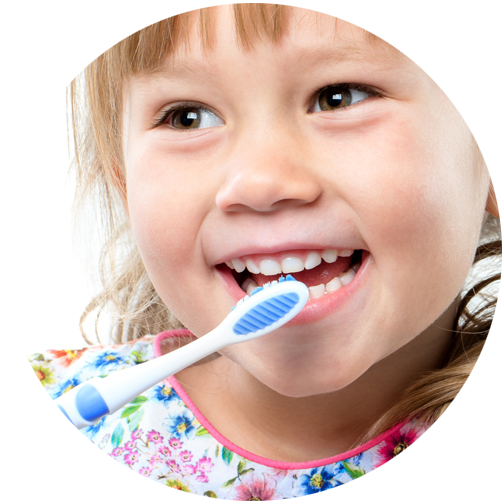
FLUORIDE AND ALTERNATIVES
The deposition of fluoride in the tooth enamel makes the teeth less sensitive to acid. The antibacterial effect of fluoride hinders the growth of bacteria found in dental plaque. In addition, fluorides promote the re-deposition of minerals from the oral fluid in the already decalcified tooth enamel, so that incipient caries can be stopped.
HOW MUCH FLUORIDE?
Fluoride is usually added to toothpaste. Until recently, the rule was: Children's toothpaste with 500ppm up to the 6th birthday, then junior toothpaste with 1000 - 1450ppm. Something has changed and the European guidelines, that have been applicable for a long time, now also apply here in Austria. So don't be surprised if there are changes to toothpastes in the near future. It has been recognised that children's toothpaste does not provide as much protection as desired and the dosage has therefore been changed as follows:
1000 ppm from the first tooth, but only the size of a grain of rice. From the second birthday, then the size of a pea.
In addition to toothpaste, fluoridated table salt is also a good option for additional protection.
FLUORIDE TABLETS AND SALT
While tablets are hardly ever given any more, fluoridated table salt is becoming increasingly popular. The advantage is that it is practically impossible to overdose and it benefits the whole family whilst eating.
XYLITOL
What is xylitol and how does it work? Xylitol - or birch sugar - creates an alkaline environment in the mouth that caries bacteria cannot tolerate. It is also said to reduce plaque formation. Xylitol cannot be utilised by caries bacteria, so they are literally wasting their efforts. The dental-clinical studies do not allow any definitive conclusions to be drawn as to whether xylitol actually has a preventive effect against tooth decay! What is certain, however, is that it does not harm the teeth and that food sweetened with xylitol is always better for the teeth than food sweetened with refined sugar!
CPP-ACP
CPP-ACP is casein phosphopeptide - amorphous calcium phosphate. This complex of active ingredients releases calcium and phosphate into the tooth structure. This is contained, for example, in the pastes GC tooth mousse (without fluoride) or GC MI Paste Plus (with fluoride).
These pastes are suitable as a supplement to normal toothpaste, or the fluoride-free version can be used if you have concerns about fluoride.
PROBIOTICS
Studies from Scandinavia show convincingly that the administration of Lactobacillus Reuteri (e.g. in the form of drops) from an early age can help to preventively reduce the risk of tooth decay. We will be happy to advise you individually. The active ingredient can also help adults with gum problems.
The risk of tooth decay varies greatly from person to person and depends on many factors. It must therefore also be treated - or avoided - differently from person to person.

